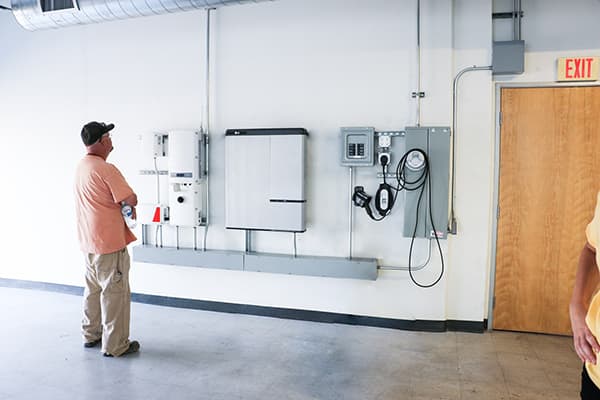Solar Battery Types and Benefits



A residential solar energy system is a great investment, but the fact that energy is only generated during the day is potentially problematic. Net metering can negate some of these problems, but it's not a perfect solution. In recent years, policy shifts and technological advancements have made installing a solar battery storage system a popular alternative. With the right system, you can tap into a range of solar battery benefits and get even more out of your investment.
Many solar-equipped homes produce more energy than they need during some periods and not enough during others. Net metering addresses this issue by allowing you to send energy to the grid when there's a surplus and draw from the grid when there's a deficit. This helps you fully take advantage of the energy you produce, but you'll still be subject to certain fees associated with the service. Time-of-use policies also mean you'll be charged or credited at rates that vary throughout the day.
Instead of sending your surplus power to the grid, a solar battery allows you to store the energy for later use. This can help you save in a few key ways. First, the stored electricity isn't subject to any net metering fees. Second, you can avoid costly on-peak electricity rates by relying on battery power during those periods. A solar battery also protects you from power outages and other issues that can disrupt power from the grid.
There's clearly a lot to love about solar battery systems, but not all batteries are equal. Choosing the right battery for your home ensures that you get the greatest benefit possible from your solar panels. There are many different solar battery types available, but most of them fall into two broad categories: lead-acid and lithium-ion.
The basic idea of a battery composed of lead and acid has been around for more than 150 years. Today, the most common types include wet-cell and absorbent glass mat (AGM) batteries. Wet-cell batteries are common, highly affordable and generally reliable. However, these bulky batteries require frequent maintenance and produce gas byproducts that need to be well-ventilated. AGM batteries are somewhat more expensive than wet-cell types, but they last longer, discharge more slowly, require less maintenance and perform better under a wider range of conditions
When it comes to storing solar energy, lithium-ion batteries are the gold standard. They may be somewhat more expensive than lead-acid batteries, but the added cost is offset by a whole host of solar battery benefits. Lithium batteries are highly efficient and reliable, requiring no maintenance or ventilation. They also have extremely low self-discharge rates and often remain effective for well over a decade.
It's this combination of low discharge, superior efficiency and compact storage capacity that makes lithium-ion an ideal solar energy storage solution. A quality lithium battery can survive more than 6,000 charge cycles. This extended lifespan adds up to long-term savings, allowing you to replace the battery far less frequently than other types.
At Sullivan Solar Power, we've always been committed to staying ahead of the curve. Our position as an early advocate of solar power storage has allowed us to develop strong relationships and supply chains. In particular, we're the nation's leading installer of LG Chem lithium-ion batteries. These advanced batteries deliver the storage capacity, reliability, and efficiency our customers deserve. As a close partner with LG Chem, we're able to offer expert installations with turnaround times that are consistently the fastest in the market.